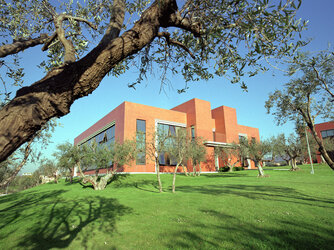Summer school success
Young Earth scientists from all over the world have wrapped up their two-week course at ESA’s ESRIN centre for Earth observation in Frascati, Italy.
Held every two years, this was the seventh edition of the Earth Observation (EO) Summer School.
The course addressed issues related to remote sensing, Earth system modelling and data assimilation, as well as the societal and business applications of Earth observation data.
“The course was very helpful, and has exposed me to new things outside of my comfort zone,” said Cristina Surdu from the University of Waterloo. She works with radar data – including data from ERS and Envisat – to monitor Arctic sea-ice and frozen lakes.
Over 70 students – mostly PhD students and young postdoctoral scientists – from 23 countries attended daily lectures by 12 leading scientists. In the afternoons, the students were given practical computing exercises on the processing of Earth observation data with computer-based learning.
“The series of excellent presentations given by various experts and the well-prepared, hands-on practical exercises gave the students the possibility to apply what they have just learned when listening to the experts presentations,” said Dr Michael Buchwitz from the University of Bremen, who lectured on greenhouse gas observations from space.

Lecturers and students also had the opportunity to discuss the current state of Earth science and applications, and their implications for society. This helped the students appreciate how their specific field fits into a broader scientific and societal context.
“I found the lectures particularly useful for understanding what the end-users need in their data products,” said Florian Filipitsch from Freie Universität Berlin, who has developed an algorithm for Envisat radiometer data to calculate absorbing aerosols over oceans in the sunglint.
The students also presented their own work to the other participants in daily poster sessions each evening. At the closing session of the Summer School, awards from the European Meteorological Society were given out to the best posters.
Winners included Delphine Leroux from CESBIO (France) for her poster on soil moisture retrieval from SMOS observations, and Jessica Daniele Flahaut from VU University Amsterdam (Netherlands) for her poster on remote sensing analysis of the Valles Marineris on Mars.
Karolina Dominika Fieber from the University of Reading (UK) was also recognised for her poster on using airborne lidar for discontinuous vegetation canopy characterisation.
The EO Summer School is supported by ESA’s Scientific Exploitation of Operational Missions (SEOM) element.















 Germany
Germany
 Austria
Austria
 Belgium
Belgium
 Denmark
Denmark
 Spain
Spain
 Estonia
Estonia
 Finland
Finland
 France
France
 Greece
Greece
 Hungary
Hungary
 Ireland
Ireland
 Italy
Italy
 Luxembourg
Luxembourg
 Norway
Norway
 The Netherlands
The Netherlands
 Poland
Poland
 Portugal
Portugal
 Czechia
Czechia
 Romania
Romania
 United Kingdom
United Kingdom
 Slovenia
Slovenia
 Sweden
Sweden
 Switzerland
Switzerland




























